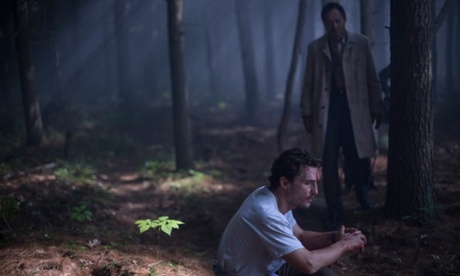
Gus Van Sant returns to the Cannes competition, and returns — horribly — to a middleweight syrupy-commercial mode of film-making into which he is capable of switching so easily. He may have permanently deserted the more challenging and rigorous style of movies like the Palme D’Or-winning Elephant, Last Days or indeed his poetically mysterious Gerry, about two guys lost in the wilderness. This fantastically annoying and dishonest tear-jerker is almost like a parodic version of that movie. (It is incidentally possible that Van Sant and screenwriter Chris Sparling were inspired by Naomi Kawase’s contemplative film The Mourning Forest, in the Cannes competition in 2007.)
For all its apparent sombreness and thoughtfulness, The Sea Of Trees is an exasperatingly shallow film on an important and agonisingly painful subject - depression and suicide. This it slathers in palliative sentimentality. The gooey musical score with strings and woodwind, kicking in from the first airport scene, unmistakably signals brimming-eyed self-pity and self-forgiveness.
Matthew McConaughey, whose performance strains every sinew, plays Arthur, an academic mathematician (he wears glasses). He is travelling to Aokigahara, or The Sea Of Trees, a vast woodland wilderness at the foot of Mount Fuji in Japan which has become notorious as a place where people come to take their own lives. Once there, Arthur has clearly reached a terrible decision. But then he sees another pilgrim of despair: Takumi (Ken Watanabe), a Japanese businessman in a rumpled suit, staggering into the clearing, covered with blood from wounds on his wrists, having evidently botched a suicide and perhaps now changed his mind. Arthur comes to help, and the two men begin a kind of friendship as they try to find a way out of the forest. Conveniently, Takumi speaks excellent English, which is neither remarked upon nor explained.
As the relationship develops, the film discloses its annoying and insidious anti-scientific and anti-rational theme - as well as its fantastic condescension to the Japanese character. Like some wise old forest sprite, Takumi pours scorn on Arthur’s attempt to understand his situation from his standpoint as a professional scientist. Naturally Arthur comes to accept the spiritual immaturity of this view.
Like Arthur’s wife Joan (Naomi Watts) - their troubled marriage is revealed in flashback - Takumi is entirely subordinate to Arthur’s dull emotional journey. But he doesn’t get any flashbacks of his own. There are some cursory lines about some disgrace and demotion in the office and casual remarks on how Arthur “doesn’t understand” suicide in Japanese culture. (Really? I’d have liked to see this glib stereotype scrutinised a little further.) But that’s it: Takumi’s pain and his story is second-class.
Naomi Watts does her best with the role of Arthur’s wife: and the film almost looks something from actual life when the two have petty marital arguments. But then a dark shadow falls on them - redemptive and love-renewing in the way these situations are supposed to be - but the finale to this situation made me want to scream at how evasive and fatuous it is.
It is Van Sant’s depiction of the forest itself which is at the centre of the problem. It is a hostile place from a straightforward view of survival: Arthur is always falling heavily down rocky slopes and getting deluged by floods, and yet McConaughey’s supposed physical pain never seems to be any sort of plausibly interesting dramatic problem. We see the dead bodies of suicides there, revealed so casually that it is at first unclear if these are hallucinations - but the film can’t decide if they should make us scared or sad. So we are neither: they are represented blankly, like the forest itself, and like the film, they are inert.







